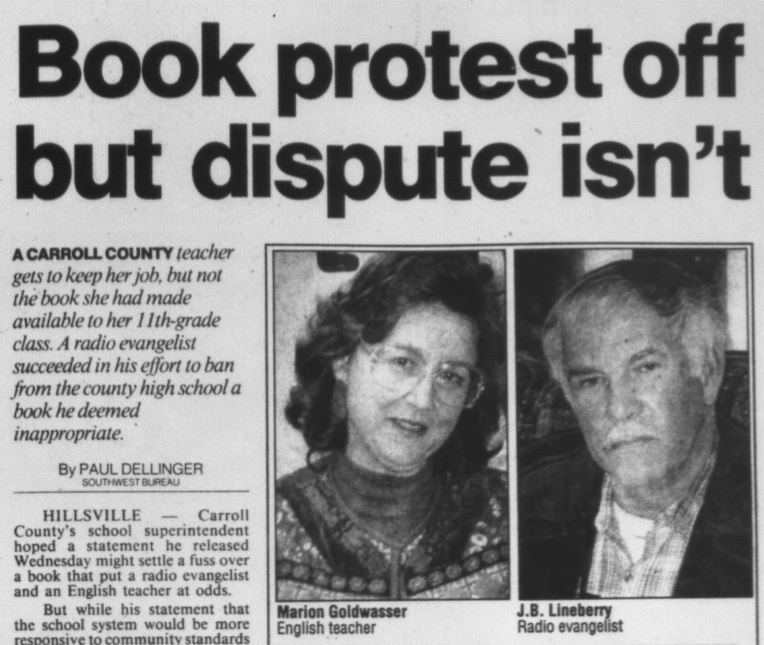Wade Humphrey was one of the parents who initiated the case by calling the local high school to register a complaint about material in The Floatplane Notebooks.1 Wade Humphrey also gave a copy of the novel to local minister, J.B. Lineberry, who became an additional challenger in the case.2 Later in the progression of the case, after Goldwasser convinced the school board to follow its challenge policy, the Humphreys (Wade and his wife, Wanda) submitted to the official written complaint against the novel that allowed the county to begin the process of evaluating the novel, a fact gathered from article from in The Virginian-Pilot. 3

After Wade Humphrey gave him a copy of the novel, Lineberry became one of the most outspoken challengers in the case. As described in news coverage from The Roanoke Times, Lineberry stated that, when he read the book “‘the only thing I found out about it was that it was wishy-washy . . ., and then it started bringing out things that could warp a child’s mind.'”4.
The article goes further to explain that Lineberry and people who agree with him were most appalled to the scene of the novel “when one of the characters loses an arm and leg in Vietnam and worries vividly about the effect on his sex life. They also object to the four-letter words used during this part of the story” 5. Goldwasser notes that Lineberry brought a lot of attention to the case by speaking against her and the novel, as well as several other entities, on his local radio station.6 Lastly, Lineberry also participated in challenging the novel by helping to organize a protest against the book on school grounds, along with other community members, that was canceled after the Superintendent of the county made a private deal with some parents to ensure that the novel would never be used in the school again.7
Lastly, beyond the Humphrey’s, Lineberry’s opinions were supported by other the Youngs and the Masons, other parents in the area. In the article, “Books foes call for rally,” Paul Dellinger identifies Jim and Darlene Young as owners of a local construction company that employed J.B. Lineberry8, demonstrating the connection between the Youngs and Lineberry. Dellinger quotes Jim Young explaining his reasons for disagreeing with the book when he explains his move from Pennsylvania to Hillsville by stating, “‘I moved out of that area to come into a better place, and this is a better place but that humanistic philosophy has started already and it’s got to be put a stop to.'”9 Likewise, Randy Mason supports Lineberry and his objects to the novel by drawing attention to the fact that the profane language of the novel has no classroom value and would not even be appropriate for him to say at work. 10
Through their objections and community, especially with Lineberry as a bonding link, the challengers of the novel have a particularly unique position in effecting change in the case.
Citations
- Goldwasser, M. M. Censorship: It Happened to Me in Southwest Virginia–It Could Happen to You. 1997. The English Journal, 86(2), 34. doi:10.2307/819671
- (Goldwasser, 1997)
- Landmark News Service. N.C. author’s book spurs controversy at Virginia high school. 16 June 1992. The Virginian-Pilot. Norfolk, VA, p. D3. NewsBank. Accessed April 26, 2019. https://infoweb.newsbank.com/apps/news/document-view?p=AWNB&docref=news/0EAFF55DD738FA17.
- Dellinger, P. Evangelist demands book ban petitions circulated to fire Carroll Teacher of the Year. 21 March 1992a. The Roanoke Times, The (VA), pp. A-3. NewsBank. Accessed April 26, 2019. https://infoweb.newsbank.com/apps/news/document-view?p=AWNB&docref=news/0EAEA28825D24776.
- (Dellinger, 1992a)
- (Goldwasser, 1997)
- (Goldwasser, 1997)
- Dellinger, P. “Books foes call for rally.” The Roanoke Times, The (VA). 24 March 1992b: B1. NewsBank. https://infoweb.newsbank.com/apps/news/document-view?p=AWNB&docref=news/0EAEA289285A42A0.
- (Dellinger, 1992b)
- (Dellinger, 1992a)
Photo Credits
Figure 1: Dellinger, P. Newspaper Clipping of Goldwasser and Lineberry. “Book protest off but dispute isn’t.” The Roanoke Times, The (VA). 26 March 1992c. Microfilm.
No Comments Yet